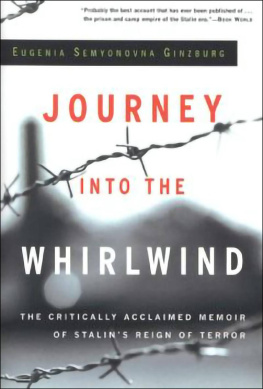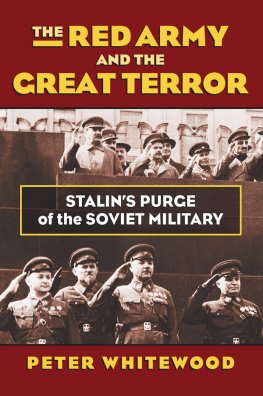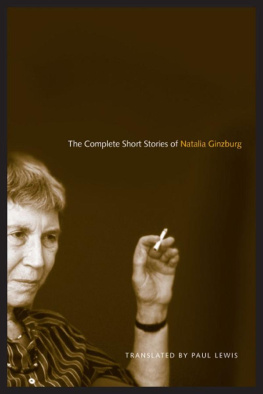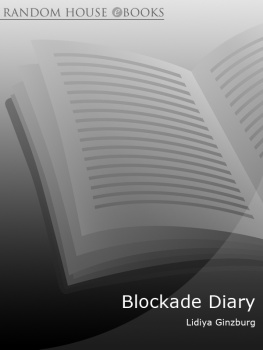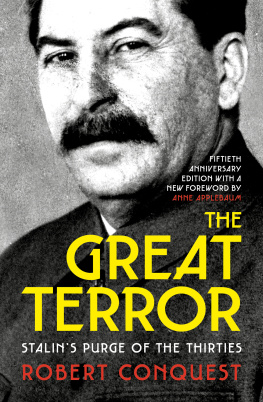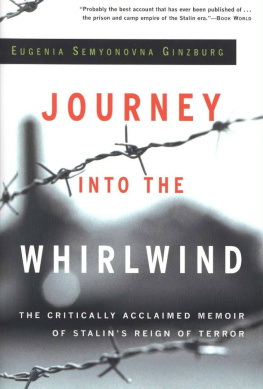
Copyright 1967 by Arnoldo Mondadori EditoreMilano
English translation copyright 1967 by Harcourt, Inc.
Copyright renewed 1995 by Harcourt, Inc.
For information about permission to reproduce selections from this book, write to or to Permissions, Houghton Mifflin Harcourt Publishing Company, 3 Park Avenue, 19th Floor, New York, New York 10016.
hmhbooks.com
Originally published in Italy: in Russian, as Krutoj Mars rut; in Italian, as Viaggio nella Vertigine.
The Library of Congress has cataloged the print edition as follows: Ginzburg, Evgenia Semenovna.
Journey into the whirlwind.
A Helen and Kurt Wolff book.
Translation of Kruto marshrut.
1. Political prisonersRussiaPersonal narratives. 2. RussiaSocial conditions1917 I. Title.
[DK268.3.G513 1975] 365'6'0924[B] 74-16406
ISBN 0-15-602751-8 (Harvest: pbk.) e ISBN 978-0-547-54101-3
v3.1020
And so I appeal to our government:
double it, treble it, the guard on this grave.
Yevtushenko

Part One
1
A telephone call at dawn
The year 1937 began, to all intents and purposes, at the end of 1934to be exact, on the first of December.
At four in the morning the telephone bell rang shrilly. My husband, Pavel Vasilyevich Aksyonov, a leading member of the Tartar Province Committee of the Party, was away on business. I could hear my children in the next room breathing evenly in their sleep.
Youre wanted at the regional committee office, Room 37, at six A.M.
This order was given me as a member of the Party.
Is it war?
But they had hung up. Clearly, in any case, there was some sort of serious trouble.
Without waking anyone, I ran out of the house long before there was any traffic in the street. I can still remember the silent snowfall and the strange lightness of my walk.
I dont want to sound pretentious, but I must say in all honesty that, had I been ordered to die for the Partynot once but three timesthat very night, in that snowy winter dawn, I would have obeyed without the slightest hesitation. I had not the shadow of a doubt of the Tightness of the Party line. Only StalinI suppose instinctivelyI could not bring myself to idolize, as it was already becoming the fashion to do. But if I felt this vague disquiet about him, I carefully concealed it even from myself.
There were already about forty fellow teachers, Communistscolleagues of mine and people I knewcrowding in the corridors outside the office. Pale and silent, they had all been wakened like me in the middle of the night. We were waiting for the regional committee secretary, Lepa.
What has happened?
Dont you know? Kirov has been murdered.
Lepa, a stolid, usually imperturbable and inscrutable Latvian, a Party member since 1913, was clearly not himself. He spoke for less than five minutes. He knew nothing whatever of the circumstances of the murder and merely repeated the words of the official communiqu. He had summoned us in order to send us out to various factories, to address the workers and give them a brief account of the situation.
I was assigned to a textile mill at Zarechye, the industrial district of Kazan. Standing on a pile of cotton-filled sacks in the middle of the factory floor, I conscientiously repeated what Lepa had told us to say, but my thoughts were in such turmoil that I could hardly keep my mind on the message.
When I got back to town, I dropped in at the committee building for a glass of tea in the canteen. Sitting next to me was Yestafyev, the director of the Marxist Institute. He was a good, simple man of proletarian origin from Rostov who had been a member of the Party since before the Revolution. In spite of the twenty years difference in our ages, we were friends and had interesting talks whenever we met. Now he drank his tea in silence, without looking at me. Then he glanced over his shoulder, leaned toward me, and said in a voice so strange, so unlike his own, that it filled me with a terrible foreboding of misfortune:
The murdererhe was a Communist, you know.
2
The red-haired professor
The long indictments in the case of Kirovs murder, published in the newspapers, made ones blood run cold but did not at the time give rise to misgivings. It was fantastic, unheard of, that the guilty menNikolayev, Rumyantsev, Katalynovshould be former members of the Leningrad Komsomol, but Pravda said so, and it must therefore be true.
Then the repercussions spread like the ripples when a stone is thrown into a quiet pool.
On a sunny day in February 1935, Professor Elvov came to see me. He had appeared on the Kazan University scene after an unpleasantness connected with the four-volume History of the All-Union Communist Party (Bolshevik), edited by Yemelyan Yaroslavsky.particular had been condemned by Stalin in his famous letter to the editor of the review Proletarian Revolution. After the appearance of the letter, the errors were defined more specifically as smuggled-in Trotskyist ideas.
But in those days, before the shooting of Kirov, matters of this sort were taken much less tragically. Elvov, with the approval of the Party, proceeded to Kazan, where he took up a professorship at the Teachers Training Institute. He was elected to the Partys municipal committee and became a speaker at meetings of Party activists and of the citys intelligentsia. Indeed, it was he who addressed the activists group on the occasion of Kirovs murder.
Elvov was a striking-looking man with a shock of curly red hair and a large head sitting squarely on his shoulders. He had almost no neck, so that his big, sturdy body gave an impression both of strength and of a sort of helplessness. Wherever he went his appearance and intellectual qualities attracted attention.
His brilliant and at times grandiloquent lectures, his trenchant and dogmatic speeches, the floods of erudition he poured out upon the timid heads of his local colleagues, had made him one of the most hated men in town. In 1935 he was thirty-three.
There he sat opposite me on that frosty, sunny February day in 1935not in the armchair beside the desk but on a plain chair in the corner of the room; his legs in their elegant boots were not sprawling as usual but tucked up under the chair. His complexion, too, was not its usual pink and white but a dirty gray. Holding on his lap my two-year-old son Vaska, who had run into the room, he was saying through bluish, trembling lips:
Ive got one too, you know. Sergey. Hes four... a good little fellow....
Later, I was often to see eyes with the same expression as Elvovs that day. There was an indefinable mixture in them of pain, anxiety, the weariness of a hunted animal, and somewhere deep down a half-crazy glint of hope. I too must have looked like that in the years that followed, but I cannot be sure, for the simple reason that in all those years I never once saw my face in a looking glass.
Whats wrong, Nikolay Naumovich?
Im in for it, thats all.... I just dropped in for a minute to tell you, so that you shouldnt think... Its all a pack of lies. I swear I never did anything against the Party.
I remember now with shame the bromides with which I tried to comfort him. Surely things couldnt be as bad as all that. At the worst, in view of the general situation at the moment, he might get a delayed reprimand for that unfortunate article... and so on....
Next page
